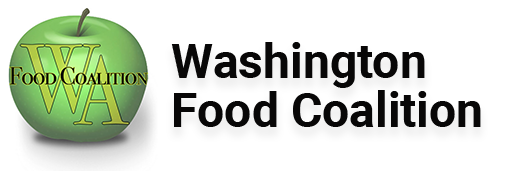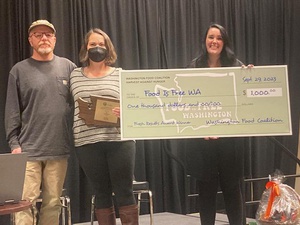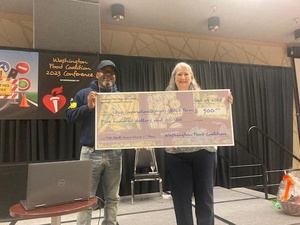|
2023 Fresh Results Award Winner The Fresh Results Award is presented in partnership with WSDA (Washington State Department of Agriculture) since 2014! This is the coalition's opportunity to celebrate the amazing and innovative work going on to bring farm fresh, healthy produce to hungry people throughout Washington. The award exemplifies a commitment to farm fresh food and connecting that produce to those you serve at your programs. This year we brought in a new partner - Harvest Against Hunger. They generously donated the $1,000 prize money for the award winner. We are thrilled to announce our 2023 Fresh Results award winner, and the Honorable mention. If you attended our fall conference, you already know who the winner is. However, if you were not there, we want to share a little bit of information about the award winner, and other nominees from this year.
More on Food Is Free Washington: Describe who is involved in this project: The non-profit works with 62 Food Independence Gardens (FIGs). The non-profit works with large farms, local stores, and Emergency Food Network to glean, rescue, and receive donations that they then distribute to over 1,800 households monthly. Describe the Project: Food is Free Washington is a 501(c)(3) charitable organization. They work to provide, and enhance equitable access to, healthy, locally produced food, at no cost, to those who need it, in the State of Washington. Food is Free Washington grows fresh produce on publicly and privately donated land and aims to distribute it immediately after it’s harvested. They fund, build, maintain, harvest, and generally work to increase the presence and productivity of community gardens. They share the produce that is grown and harvested with the community at weekly share events in local parks and at food rescue sites. They collaborate with existing public and private gardening and farming programs, gleaning and food rescue programs, and food distribution programs. They use email, SMS, and social media to proactively notify the community when fresh food is available. Describe the Impact this Project has on your program(s) and on the community: Food is Free Washington started in May 2015, as Food Is Free Tacoma, with the simple idea of building community through the giving and sharing of homegrown fruits & vegetables. Since their inception, they have built, planted, harvested, and continue to maintain 52 streetside gardens, 3 larger garden projects, They’ve “rescued” many thousands of pounds of food to share with the community, and grown and shared over 10,000 vegetable starts for free to the public. Serving the community through Food is Free Washington is about more than distributing fresh produce and food to our neighbors in need — it is about building local connections that lead to stronger, healthier communities. Describe any Challenges and Lessons Learned: It was challenging at first to get all the different volunteers and neighborhood farmers together under the same umbrella so that they could become as effective as they have been able to in 2023. Our honorable mention this year was Kitsap Conservation District’s GRACE (Growing for Restoration, Agricultural and Conservation Education) Program. Chris Benson with the Central Kitsap Food Bank accepted their award check on behalf of Diane Fish of the Kitsap Conservation District. Describe the Project:
How is this Project Innovative? What is new & different about it? Did you involve new partners? Traditionally, Conservation Districts work with farmers and landowners on natural resource conservation planning – environmental and agricultural programming primarily. The GRACE Program does all those things on their demonstration farm – but as part of our innovative partnership also works to build a more equitable food system and combat hunger by donating all their produce to food banks in Kitsap and North Mason Counties. The work in the local food system and hunger relief makes our partnership with Kitsap Conservation District unique among Washington’s 45 Districts. Because the District works closely with local farmers we have a robust Farm to Food Bank program contracting with a diverse, inclusive group of 14 local farmer including BIPOC, LBGTQIA+, woman and veteran-owned farms. Due to their connections with farmers markets we worked to promote the SNAP-EBT Market Match Program to our clients. During Spring 2022 grants secured by KCD will fund development of Guatemalan and Filipino recipes for SNAP-Ed along with cooking videos and multi-language recipe cards to accompany the processed soups distributed to our clients. Describe the Impact this Project has on your program(s) and on your clients. Since 2017 the Kitsap Food Bank Coalition / GRACE Program partnership delivered 175,000# of fresh produce into Kitsap’s hunger relief system!! Our clients love the variety and freshness of the produce. One focus of the GRACE Program – both at their farm and with the farmers they work with as part of the F2FP Program – is purchasing culturally appreciated/familiar items for our Hispanic, Asian, Black and Pacific Islander clients. As part of our collaboration, we can now offer clients vegetables like Bitter Melon, Upo, Collard and Turnip Greens, Tomatillos and herbs like Cilantro and Basil to provide a more dignified shopping experience when they visit our programs. Between 2019-2021 KCD partnered with food banks and Kitsap Harvest Gleaning program on over $80,000 in grants via WSDA’s capacity building and USDA Farm to Food Bank programs. With a portion of this funding, KCD worked with local restaurants and Kitsap Community Resources to process seasonally excess produce into over 10,000 servings of delicious, nutritious ready-to-eat soups, sauces, and salsas for our clients. The district worked with community members on recipes for Filipino, Guatemalan and Hawaiian foods, used gleaned, donated and locally grown vegetables to make the soups, and produced cooking videos and recipes for us to share with clients along with the soups, sauces, and salsa. Their commitment to inclusion and equity allows us to provide cultural foods to clients. As you are well aware, we are faced with increasing demand for emergency food due to inflation and post-pandemic effects, along with shrinking grocery rescue opportunities. Some weeks the only produce available at some Kitsap food banks is provided by the GRACE Program, the community gardens they support, and F2FP Program. Without their partnership, we wouldn’t be able to offer fresh, healthy choices to our clients. Describe any Challenges and Lessons Learned Relationships form the foundation for all partnerships. The main lesson learned from our partnership is to embrace new opportunities – no matter how unconventional they seem at the outset! Trusting each other, mutual respect, and continuing to show up for one another are keys to successfully working together. Our relationship began in 2017 when Kitsap Conservation District received funding from a small grant to work on food security. What began as a happy accident of proximity and providence – but has continues to grow, engaging a growing circle of other organizations and individuals working to build a more equitable, just, and healthy food system for our community. Other Nominees included:
|

 The winner for 2023 was Food Is Free Washington nominated by the Emergency Food Network. We were thrilled that Ursula Thompson, Director of Operations, and her husband could join us in Yakima to receive their award and prize check in the amount of $1,000. Thanks to Harvest Against Hunger for their generous contribution of the prize money!
The winner for 2023 was Food Is Free Washington nominated by the Emergency Food Network. We were thrilled that Ursula Thompson, Director of Operations, and her husband could join us in Yakima to receive their award and prize check in the amount of $1,000. Thanks to Harvest Against Hunger for their generous contribution of the prize money! The Kitsap County Food Bank Coalition partners with Kitsap Conservation District’s GRACE Program to deliver 20,000 pounds of locally grown produce to food banks in Kitsap and North Mason Counties. They support six community/food bank gardens with plant starts and information on succession planting, food safety and other tips to help them grow more food for the hunger relief system. In addition to growing vegetables year-round on a one-acre sustainable agriculture demonstration/food bank farm, the District’s GRACE Program coordinates the Farm to Food Pantry Program (F2FP) supporting sustainable farms and providing an additional 17,000 pounds of fresh produce annually.
The Kitsap County Food Bank Coalition partners with Kitsap Conservation District’s GRACE Program to deliver 20,000 pounds of locally grown produce to food banks in Kitsap and North Mason Counties. They support six community/food bank gardens with plant starts and information on succession planting, food safety and other tips to help them grow more food for the hunger relief system. In addition to growing vegetables year-round on a one-acre sustainable agriculture demonstration/food bank farm, the District’s GRACE Program coordinates the Farm to Food Pantry Program (F2FP) supporting sustainable farms and providing an additional 17,000 pounds of fresh produce annually. Our work is generously supported in part by the Washington State Department of Agriculture, Food Assistance programs. In accordance with Federal law and U.S. Department of Agriculture policy, the Washington Food Coalition as an institution is prohibited from discriminating based on race, color, national origin, sex, disability or age.
Our work is generously supported in part by the Washington State Department of Agriculture, Food Assistance programs. In accordance with Federal law and U.S. Department of Agriculture policy, the Washington Food Coalition as an institution is prohibited from discriminating based on race, color, national origin, sex, disability or age.